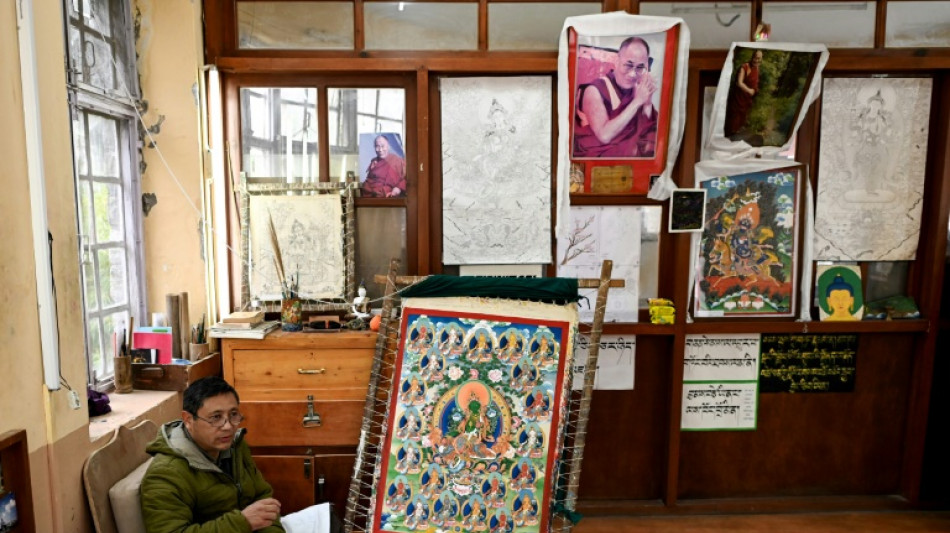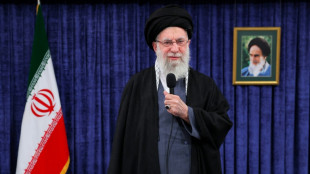
-
 AI chatbots give bad health advice, research finds
AI chatbots give bad health advice, research finds
-
Iran steps up arrests while remaining positive on US talks

-
 Frank issues rallying cry for 'desperate' Tottenham
Frank issues rallying cry for 'desperate' Tottenham
-
South Africa pile up 213-4 against Canada in T20 World Cup

-
 Brazil seeks to restore block of Rumble video app
Brazil seeks to restore block of Rumble video app
-
Gu's hopes of Olympic triple gold dashed, Vonn still in hospital

-
 Pressure mounts on UK's Starmer as Scottish Labour leader urges him to quit
Pressure mounts on UK's Starmer as Scottish Labour leader urges him to quit
-
Macron backs ripping up vines as French wine sales dive

-
 Olympic freeski star Eileen Gu 'carrying weight of two countries'
Olympic freeski star Eileen Gu 'carrying weight of two countries'
-
Bank of France governor Francois Villeroy de Galhau to step down in June

-
 Tokyo stocks strike record high after Japanese premier wins vote
Tokyo stocks strike record high after Japanese premier wins vote
-
'I need to improve', says Haaland after barren spell

-
 Italian suspect questioned over Sarajevo 'weekend snipers' killings: reports
Italian suspect questioned over Sarajevo 'weekend snipers' killings: reports
-
Von Allmen at the double as Nef seals Olympic team combined gold

-
 Newlyweds, but rivals, as Olympic duo pursue skeleton dreams
Newlyweds, but rivals, as Olympic duo pursue skeleton dreams
-
Carrick sees 'a lot more to do' to earn Man Utd job

-
 Olympic star Chloe Kim calls for 'compassion' after Trump attack on US teammate
Olympic star Chloe Kim calls for 'compassion' after Trump attack on US teammate
-
US vice president visits Armenia, Azerbaijan to 'advance' peace

-
 'All the pressure' on Pakistan as USA out to inflict another T20 shock
'All the pressure' on Pakistan as USA out to inflict another T20 shock
-
Starmer vows to remain as UK PM amid Epstein fallout

-
 Gremaud ends Gu's Olympic treble bid with freeski slopestyle gold
Gremaud ends Gu's Olympic treble bid with freeski slopestyle gold
-
Howe would 'step aside' if right for Newcastle

-
 Sakamoto wants 'no regrets' as gold beckons in Olympic finale
Sakamoto wants 'no regrets' as gold beckons in Olympic finale
-
What next for Vonn after painful end of Olympic dream?

-
 Brain training reduces dementia risk by 25%, study finds
Brain training reduces dementia risk by 25%, study finds
-
Gremaud ends Gu's hopes of Olympic treble in freeski slopestyle

-
 Shiffrin and Johnson paired in Winter Olympics team combined
Shiffrin and Johnson paired in Winter Olympics team combined
-
UK's Starmer scrambles to limit Epstein fallout as aides quit

-
 US skater Malinin 'full of confidence' after first Olympic gold
US skater Malinin 'full of confidence' after first Olympic gold
-
Sydney police pepper spray protesters during rallies against Israeli president's visit

-
 Tokyo stocks hit record high after Japanese premier wins vote
Tokyo stocks hit record high after Japanese premier wins vote
-
Israel says killed four militants exiting Gaza tunnel

-
 Franzoni sets pace in Olympic team combined
Franzoni sets pace in Olympic team combined
-
Captain's injury agony mars 'emotional' Italy debut at T20 World Cup

-
 Family matters: Thaksin's party down, maybe not out
Family matters: Thaksin's party down, maybe not out
-
African players in Europe: Ouattara fires another winner for Bees

-
 Pressure grows on UK's Starmer over Epstein fallout
Pressure grows on UK's Starmer over Epstein fallout
-
Music world mourns Ghana's Ebo Taylor, founding father of highlife

-
 HK mogul's ex-workers 'broke down in tears' as they watched sentencing
HK mogul's ex-workers 'broke down in tears' as they watched sentencing
-
JD Vance set for Armenia, Azerbaijan trip

-
 Sydney police deploy pepper spray as Israeli president's visit sparks protests
Sydney police deploy pepper spray as Israeli president's visit sparks protests
-
EU warns Meta it must open up WhatsApp to rival AI chatbots

-
 Scotland spoil Italy's T20 World Cup debut with big win
Scotland spoil Italy's T20 World Cup debut with big win
-
Stocks track Wall St rally as Tokyo hits record on Takaichi win

-
 Israeli president says 'we will overcome evil' at Bondi Beach
Israeli president says 'we will overcome evil' at Bondi Beach
-
Munsey leads Scotland to 207-4 against Italy at T20 World Cup

-
 Venezuela's Machado says ally 'kidnapped' after his release
Venezuela's Machado says ally 'kidnapped' after his release
-
Japan restarts world's biggest nuclear plant again

-
 Bangladesh poll rivals rally on final day of campaign
Bangladesh poll rivals rally on final day of campaign
-
Third impeachment case filed against Philippine VP Duterte


Exiled Tibetans guard heritage from 'cultural genocide'
From teaching centuries-old crafts to cataloguing their language, exiled Tibetans guard the cultural identity of a homeland most have neither seen nor dare visit, and where they say Beijing is eradicating their heritage.
Crouched over a minutely detailed devotional "thangka" painting depicting Buddha, artist Lobsang Tenzin teaches students in northern India.
"It is important to keep the traditions of our history," said the 49-year-old, dipping a needle-thin brush into rich blue paint made from crushed lapis lazuli as six young Tibetan trainees watch.
"These skills were nearly lost, but we pass on the skills by teaching young artists."
Tibetans will on March 10 mark the 65th anniversary of the 1959 uprising against Chinese forces that led to their spiritual leader the Dalai Lama fleeing into exile, followed by tens of thousands of compatriots.
Inside Tibet, the chaos of China's 1966-76 Cultural Revolution left temples razed and monasteries reduced to ruins, destruction that continued in the decades that followed.
Today, activists decry what they say are Beijing's determined efforts to erase what is left of Tibet's cultural and religious identity.
Lhadon Tethong, head of the Tibet Action Institute, condemns what she calls "cultural genocide" -- including Beijing's sharp restrictions on Tibetan language, with children "indoctrinated" at state-run boarding schools.
Beijing, which maintains "Tibet is part of China", fiercely rejects the accusations.
Chinese foreign ministry spokeswoman Mao Ning this week said that people in Tibet are "living a happy life", in response to UN rights chief Volker Turk's assertion that China was violating fundamental rights.
Tibet enjoys "social stability, economic growth, solidarity among all ethnic groups and harmony among various religious beliefs", she said.
- 'Former glory' -
Tibet scholar Robert Barnett, from SOAS University of London, called Beijing a "foreign ruler deciding what's best for a people whose culture it barely knows".
"There is a gradual whittling away of a culture and a history," Barnett said.
"It is a process where you gradually eliminate all the elements of a history, a people, culture and of a society that are inconvenient to the new rulers."
Tibetan authorities say there are 130,000 Tibetan exiles, many in India and Nepal but also in more than 25 countries worldwide -- just a fraction of the seven million living under China's control.
As the decades pass, that makes the preservation of cultural identity even more challenging.
Tenzin studied and now teaches at the Norbulingka Institute, a social enterprise centre training more than 300 men and women in painting, embroidery, weaving and woodcarving.
The complex of red and green Tibetan-style buildings, close to the Dalai Lama's base in India's Himalayan hill town of Dharamsala, was launched in 1995 to employ highly skilled artisans eking out a living with repair jobs.
"After the great masters came to India, they ended up doing odd jobs, trying to build their lives in a new country," said Tsultrim Dorjee, a senior manager at the institute.
"The institute helped them use their skills... the goal was to return Tibetan art to its former glory."
Others take a more modern approach, like 29-year-old artist Tashi Nyima, with his bright cartoon-style canvases that nonetheless still reflect his people's heritage and political battles.
Born and brought up in Dharamsala, where red-robed monks and nuns crowd streets alongside Tibetans in baseball caps and jeans, Nyima said younger generations struggle with a "very mixed identity".
But he remains committed to the cause.
"I've always believed that Tibet will be free one day," he said, in front of his painting of a shackled monk.
"If I didn't have this belief in me, I wouldn't have done these kinds of works -- I would have just stopped."
- 'Long haul' -
Another battle is keeping the language alive.
While Google Translate offers 133 languages, Tibetan is not among them -- but exiles in 2022 released their own 223-volume dictionary, available online.
"Once the language is preserved, then everything falls in place," said Dorji Damdul, director of Tibet House in New Delhi, founded by the Dalai Lama to promote his people's heritage.
"Language is like the medium through which all the flow of culture and philosophy happens."
But young Tibetans in India are increasingly seeking opportunities in Europe and North America.
Damdul, born in India in 1968 and a former translator for the Dalai Lama, admits that keeping an identity alive is a "major challenge".
"In Tibet, assimilation by force happens with the communist Chinese," said the Buddhist scholar. "In the West, natural assimilation can happen because it's too free."
Tibet's Dharamsala-based government in exile says it is looking to keep the increasingly scattered community connected, including via online conferences teaching younger generations about their history.
"If they understand Tibet a little more, they could be the best advocates," said Penpa Tsering, elected as the government's sikyong, or leader, by Tibetans worldwide.
"Even though we are physically distant, we are mentally close together."
Tsering's administration oversees more than 60 Tibetan language schools in India and Nepal and supports nearly 300 monasteries and nunneries.
"We are here for the long haul," said Tsering. "Don't think that we'll vanish just like that."
E.AbuRizq--SF-PST



